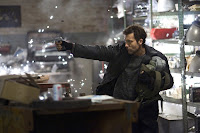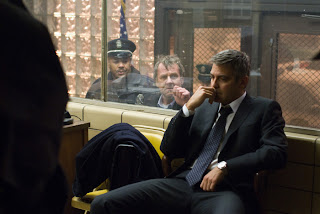An onslaught of testosterone invades movie theaters this weekend with the grizzly western 3:10 to Yuma and the go-for-broke action flick Shoot ‘Em Up battling it out in wide release (and to a lesser extent the fertilization comedy The Brothers Solomon). I find it positively shocking that Lionsgate and New Line would release Yuma and Shoot in the same weekend. While Yuma is more likely to attract older movie goers thanks to its western nostalgia and Shoot will lure younger viewers with its hyperkinetic aesthetics, the main demographic remains the same for both films: Males 17-34.
It’s open season as to which film will claim stake at the box office this weekend; my instinct is Yuma but neither would surprise me. But why choose just one anyway? The two seem generated to fit perfectly into the parameters of a Grindhouse-style double feature. That’s the route my buddy and I took this afternoon and the long and short of it is that Yuma is a fairly solid choice under most circumstances, whereas Shoot ‘Em Up should be viewed as the second half of a double header or not at all.
While Yuma is branded the A picture somewhat by default (it could be the B in certain situations), it at least has enough substance to stand on its own two legs. Shoot ‘Em Up is the cinematic equivalent of fast food: momentarily satiating but ultimately unsatisfying and devoid of any nutritional value.

A 14-year-old videogame geek’s wet dream and an expecting parent’s nightmare, Shoot ‘Em Up is a hyperactive collection of extreme action set-pieces strung together by loud rock music, a gun fetish, an orphaned baby and a cooler than cool Clive Owen at his most rough and tumble. I laughed a few times and enjoyed the occasional self-referential mockery but shudder at the prospect of teenage boys trying to gouge out each other’s eyes with raw carrots after seeing the movie.
The only thing Shoot ‘Em Up takes seriously is guns. Not in the pro- or anti-gun control sense (the movie seems to endorse both sides of the argument) but in the sheer knowledge of the inner workings of artillery. The characters in the film are up to date with the latest in fingerprint technology and know that when a gun is fired, the nozzle becomes scalding hot and that if a gun is accidentally dropped in a toilet bowl, it will need to be properly dried before working again.
Toting bigger guns but firing more judiciously are the characters of 3:10 to Yuma. They also boast a much more consistent rate of bullet-to-body ratio than the incessant hail of gunfire swirling around the scenes of Shoot ‘Em Up. One of Yuma’s nicest qualities is the restraint in its depiction of brutality. Make no mistake, the grim lawlessness of the Wild West is in full effect and the film contains a couple of harrowing sequences but the violence never becomes excessive. In other words, I’d easily send my Mom to see it without any words of caution.
The most complex element in 3:10 to Yuma is the presentation of character psychology. Similar to the dilemma in last year’s The Prestige (another Christian Bale film), you’re not always entirely sure who you want to survive here: the Bale character or the Russell Crowe character. While Bale is unquestionably the picture’s hero and of course we want to see him succeed by default, we also become quite fond of Crowe’s charming rogue and thus have to grapple with the truth that either character’s survival is predicated upon the other’s demise. Unfortunately, character motivation becomes somewhat erratic in the film’s final scenes and it’s hard to shake the feeling that – as much fun as it is to watch the brilliant Bale act in any movie – he’s slightly miscast, always appearing too stoic to play the social whipping boy that is his character. Nevertheless, these are still three-dimensional characters and that makes all the difference when compared to the one-dimensional bots that populate the visual orgy of Shoot ‘Em Up.

 of immorality that has engulfed them. Whenever it seems like either one has an opportunity to break out, the system pulls them back in (to paraphrase Al Pacino in The Godfather Part III). In a brilliantly telling violation of the 180 degree rule early in the film, the camera cuts between Michael and Arthur from opposite sides of the room, reversing their positions on screen and effectively entwining their conditions – although not necessarily their fates.
of immorality that has engulfed them. Whenever it seems like either one has an opportunity to break out, the system pulls them back in (to paraphrase Al Pacino in The Godfather Part III). In a brilliantly telling violation of the 180 degree rule early in the film, the camera cuts between Michael and Arthur from opposite sides of the room, reversing their positions on screen and effectively entwining their conditions – although not necessarily their fates. 









